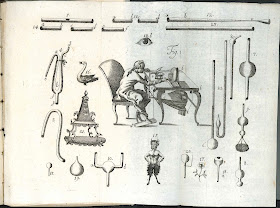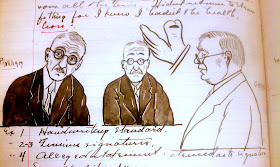 We just acquired a very curious little book. Die Glasschmelzkunst (Vienna: Schultz, 1769) is a manual for 18th-century do-it-yourself chemists. It provides detailed instruction for manufacturing thermometers, hydrometers, barometers and even glass eyes. But it was figure 15 in the illustration here that caught our attention.
We just acquired a very curious little book. Die Glasschmelzkunst (Vienna: Schultz, 1769) is a manual for 18th-century do-it-yourself chemists. It provides detailed instruction for manufacturing thermometers, hydrometers, barometers and even glass eyes. But it was figure 15 in the illustration here that caught our attention.At first we wondered if it was some kind of little science faun to consult when things went terribly wrong, but then we dug out our German dictionary and read the text. It is a model of a Cartesian Diver, a figure with a hollow tube inside with an opening on one end. If you place the Diver in a closed container of water (a two-liter water bottle would work great, but not in the 18th century), it will float. When you squeeze the bottle, the pressure will drive water up into the tube and compress the air. The Diver's overall water displacement will change, and he will slowly dive to the bottom of the bottle (or quickly, if you squeeze really hard). It is a great way to measure pressure.
You can come in and see it now by asking for Rauner Rare TP 859.2 .B11 1769.





